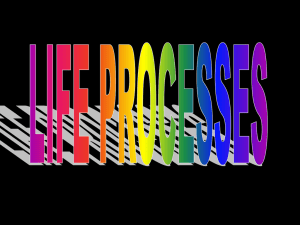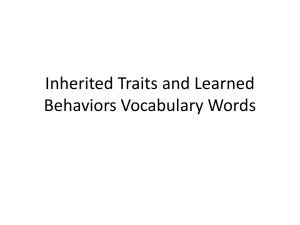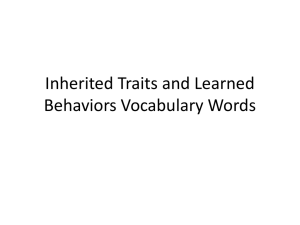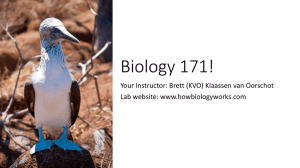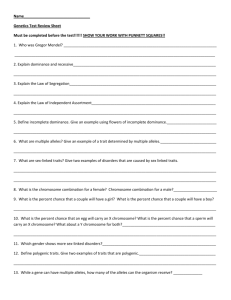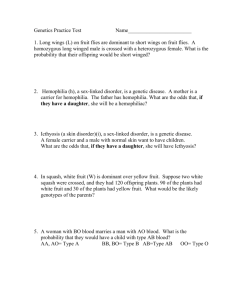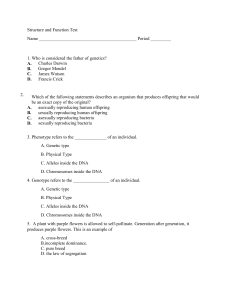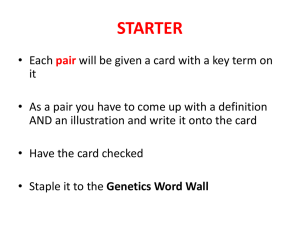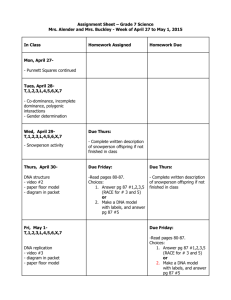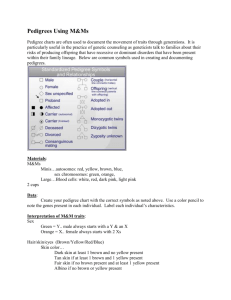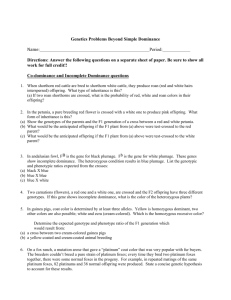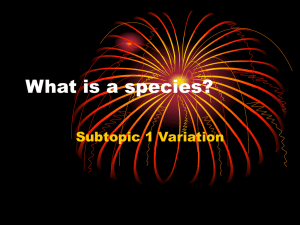Genetics & Biotechnology - juan
advertisement
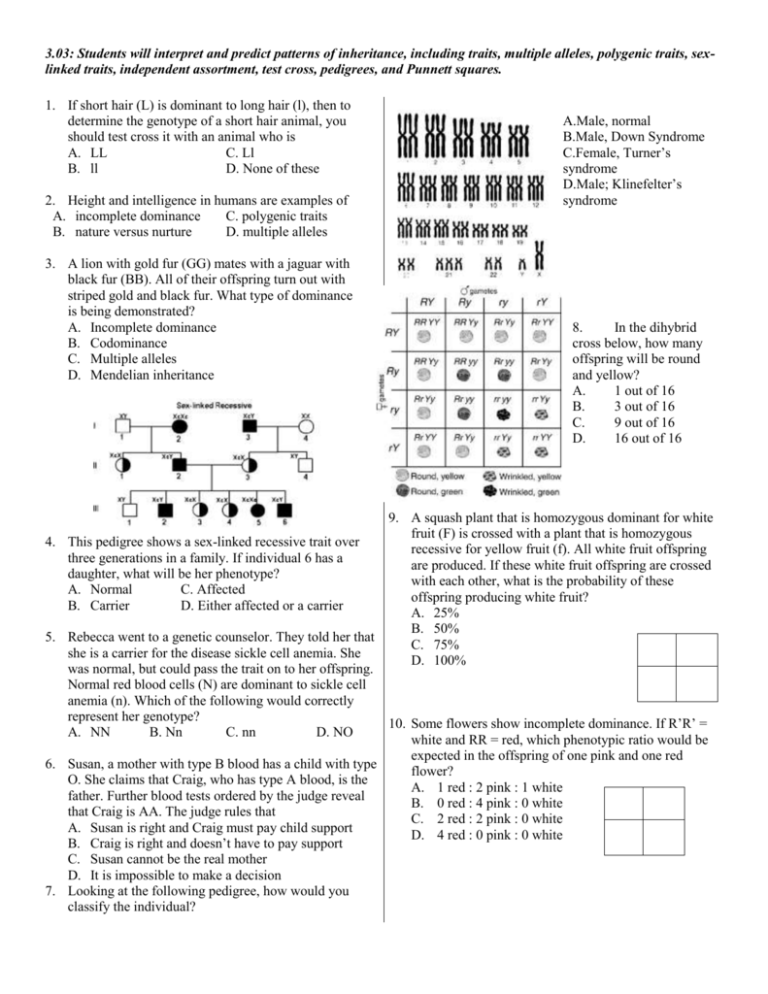
3.03: Students will interpret and predict patterns of inheritance, including traits, multiple alleles, polygenic traits, sexlinked traits, independent assortment, test cross, pedigrees, and Punnett squares. 1. If short hair (L) is dominant to long hair (l), then to determine the genotype of a short hair animal, you should test cross it with an animal who is A. LL C. Ll B. ll D. None of these 2. Height and intelligence in humans are examples of A. incomplete dominance C. polygenic traits B. nature versus nurture D. multiple alleles 3. A lion with gold fur (GG) mates with a jaguar with black fur (BB). All of their offspring turn out with striped gold and black fur. What type of dominance is being demonstrated? A. Incomplete dominance B. Codominance C. Multiple alleles D. Mendelian inheritance 4. This pedigree shows a sex-linked recessive trait over three generations in a family. If individual 6 has a daughter, what will be her phenotype? A. Normal C. Affected B. Carrier D. Either affected or a carrier 5. Rebecca went to a genetic counselor. They told her that she is a carrier for the disease sickle cell anemia. She was normal, but could pass the trait on to her offspring. Normal red blood cells (N) are dominant to sickle cell anemia (n). Which of the following would correctly represent her genotype? A. NN B. Nn C. nn D. NO A.Male, normal B.Male, Down Syndrome C.Female, Turner’s syndrome D.Male; Klinefelter’s syndrome 8. In the dihybrid cross below, how many offspring will be round and yellow? A. 1 out of 16 B. 3 out of 16 C. 9 out of 16 D. 16 out of 16 9. A squash plant that is homozygous dominant for white fruit (F) is crossed with a plant that is homozygous recessive for yellow fruit (f). All white fruit offspring are produced. If these white fruit offspring are crossed with each other, what is the probability of these offspring producing white fruit? A. 25% B. 50% C. 75% D. 100% 10. Some flowers show incomplete dominance. If R’R’ = white and RR = red, which phenotypic ratio would be expected in the offspring of one pink and one red 6. Susan, a mother with type B blood has a child with type flower? O. She claims that Craig, who has type A blood, is the A. 1 red : 2 pink : 1 white father. Further blood tests ordered by the judge reveal B. 0 red : 4 pink : 0 white that Craig is AA. The judge rules that C. 2 red : 2 pink : 0 white A. Susan is right and Craig must pay child support D. 4 red : 0 pink : 0 white B. Craig is right and doesn’t have to pay support C. Susan cannot be the real mother D. It is impossible to make a decision 7. Looking at the following pedigree, how would you classify the individual? 3.04: Assess the impacts of genomics on individuals and society, including the Human Genome Project and applications of biotechnology. 11. Scientists have cloned sheep but have not yet cloned a human. The best explanation for this situation is that A. There are many ethical problems involved in cloning humans B. The technology to clone humans has not been explored C. Human reproduction is very different from that of other mammals D. Cloning humans would take too long 12. Which process is illustrated in the diagram below? A. B. C. D. Selective breeding Genetic engineering Therapeutic cloning Genetically modified crops Use the diagram below to answer question 3 and 4. 15. How would genetically altering plants for pest resistance be economically beneficial? A. Erosion of topsoil would no longer be a concern B. Crops would be more easily protected from weeds C. Crop-eating pests would no longer ruin crops D. Abnormal plant growth would be eliminated 16. The gene for the production of human insulin is inserted into certain bacterial cells. The offspring of these bacterial cells will most likely be able to A. Destroy pathogens B. Synthesize this hormone C. Reproduce sexually D. Form human tissue 17. What is the significance of the Human Genome Project? A. The cause of cancer was discovered B. The 3 billion bases in human DNA were discovered C. The structure of DNA and how it is made was determined D. All of the proteins made by human DNA were discovered 18. Which transplant method would prevent the rejection of an organ after a transplant? A. Using organs cloned from the cells of the patient B. Using organs produced by genetic engineering to get rid of all proteins in the donated organs C. Using organs only from pigs or monkeys D. Using an organ donated by a close relative Use the image below to answer questions 99 and 100: 13. One common use of this technology is the A. Production of human embryos to aid women who are unable to have children B. Change of single celled organisms to multicellular organisms C. Production of missing body chemicals, like the 19. Which person’s DNA matches the blood stain? hormone insulin A. Bob C. John D. Introduction of a toxic substance to kill bacterial B. Sue D. Lisa cells 14. Structure B represents which of the following molecules? A. A ribosome C. Transfer RNA B. Recombinant DNA D. An enzyme 20. What process created the image above? A. Human genome project B. Gene mapping C. Polymerase chain reaction D. Gel electrophoresis
